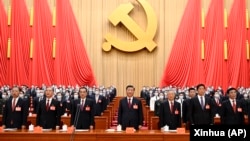Chinese President Xi Jinping reaffirmed his commitment to his government’s zero-COVID policy during an address to the Chinese Communist Party’s 20th Party Congress Sunday.
Analysts say the remarks may disappoint many people who were hoping Xi would abandon tight restrictions that have shut out foreigners and slowed economic growth. The policy is blamed for contributing to a global supply chain shortage and delaying the recovery of the aviation and tourism sectors.
“Even though everyone can see economic growth has slowed, he still wants to persist in zero-COVID. This will hurt people’s livelihoods,” said Simon Chen, a political science professor at National Taiwan University.
Observers have speculated that although its infection and death rates are very low, China has not reopened its borders and returned to normal life because Beijing refuses to allow imports of widely used vaccines developed by Western companies, such as Pfizer-BioNtech and Moderna.
China has relied on domestically produced vaccines and some observers see Xi’s insistence on the zero-COVID policy as evidence that his government does not believe its vaccines will protect against a new wave of infections expected this winter.
“If he gives up this policy, major problems could occur,” said Chen, adding China may also be trying to give itself time to develop its own mRNA-based vaccine, which is considered more effective.
Victor Gao, a professor at China’s Soochow University and vice president of the Beijing-based research group Center for China and Globalization, says the government’s position is aimed at prioritizing saving lives and preventing deaths.
“At the core of human rights in China is life, the right to live,” Gao said. “Now you have two ways to deal with the virus. One is herd immunity and two is dynamic zero-COVID. Herd immunity is a dead end because China’s CDC doesn’t allow it; it means you have to sacrifice tens of thousands or hundreds of thousands of people and if this happened in China, you’re talking about close to 10 million people dead because of COVID-19.”
He was referring to the Chinese Center for Disease Control and Prevention.
Maintaining the zero-COVID policy doesn’t mean the policy will remain unchanged, Gao said. He pointed out that China’s quarantine period for COVID-19 has already been adjusted from two weeks to seven days. Depending on the severity of the infection, along with vaccination and death rates, it could be further reduced or even eliminated, he added.
Jean-Pierre Cabestan, a researcher at the French Centre for Research on Contemporary China, Hong Kong, said that despite some opposition within the party to the zero-COVID policy, there is strong support overall for it in some small cities and among physicians and experts in China.
He suspects Xi and the leadership are conservative and believe it’s better to keep China closed for now.
“My hunch is something else is behind it, the desire not to open up China too much to the outside world. I think what they’re worried about is changes within Chinese society, youths,” Cabestan said. “He [Xi] says the economy is a priority, but we don’t know if security is more important than economic development to him.”







